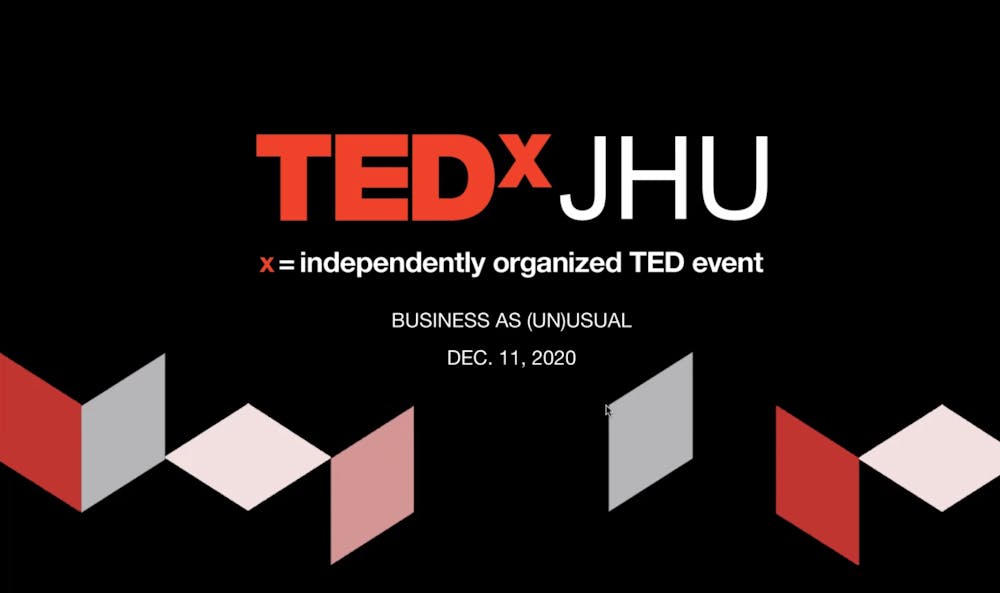TEDxJHU hosted its salon 2020 event, “Business as (Un)usual,” on Dec. 11. Four students — seniors Anjali Kashyap, John Min, Isabel Rios-Pulgar and senior Serena Wang — gave talks on topics ranging from Brazilian Jiu-Jitsu to the immigrant experience over the course of the night. The event was organized independently from TED Talks.
Co-organizer Trent Dilka described the purpose of the event as uplifting previously silenced voices.
“Within the Baltimore and Hopkins communities, especially considering the events of the recent years, months and days, we acknowledge that there are stories, even and especially within our university’s own history, that are being voiced,” he said. “While it may be uncomfortable, we have a responsibility to listen to and engage with this discourse.”
In an email to The News-Letter, junior Honor Zetzer stated that the event helped her reevaluate academic stressors.
“A lot of the talks were from students who had navigated some major shift in their perspective on life, themselves and overcoming challenges,” she wrote. “It helped put things into perspective right as we are entering finals.”
During his talk, Min highlighted the importance of failure, citing his experience trying out Brazilian Jiu-Jitsu. According to Min, the sport was the first thing in his life he allowed himself to fail at. Through those failures, he found support and self-improvement.
Min called on audience members to try something they expected to fail in.
“Find something small that you think you’ll fail, and try and prove yourself right. After all, what’s the worst that could happen? You prove yourself wrong?” he said. “If you start approaching life with the idea that failures are investments in your future self, a gain instead of a loss, there’s no way you can lose.”
Kashyap, the second speaker, told a story about finding her identity as an Indian American. Growing up, Kashyap’s peers in Cleveland pronounced her name Ann-jali, while her family members pronounced it Uhn-jali.
Kashyap did not mind this until she arrived at Hopkins, where she encountered a greater population of South Asian students than in her high school. According to Kashyap, she was accused of whitewashing herself when she asked to be called Ann-jali.
It took Kashyap lot of Googling — including a deep dive into the struggles Vice President-elect Kamala Harris has had with her name’s pronunciation — before she realized that her identity can be whatever she wants it to be.
“I had forgotten about the single most important thing about my own identity,: my own voice,” she said.
Kashyap challenged her listeners to become more inclusive in their ideas about belonging.
“I want you all to think of a time when someone has said to you, ‘you’re not Black enough,’ ‘you’re not rich enough,’ ‘you’re not queer enough,’ ‘you’re not feminine enough,’” she said. “I am here today to say you are enough and I am enough.”
The third speaker, Rios-Pulgar, shared how struggling with her lupus diagnosis led her to rethink the definition of success.
Caring for oneself, Rios-Pulgar said, should be considered crucial to any accomplishment.
“If success is just little pockets of bliss, then why do we never include self-care in the little conversations about success? When we take care of ourselves, we are giving our minds and our bodies permission to temporarily alleviate life’s pressures,” she said. “We are giving ourselves momentary bliss. So then why is it that self=care is not the first thing that we think of when we think about success?”
Hopkins students are known for taking their academic work seriously. Rios-Pulgar encouraged her audience to listen to their bodies’ cues when striving for academic perfection.
“No one ever teaches you that in order to be successful in the long term, to maintain that grind, you must take time for yourself,” she said. “No one ever tells you to care as much about yourself as you do about your goals. This is what’s wrong with your academic culture and our definition of success today.”
The theme of changing one’s outlook on their academic responsibilities resonated with Zetzer.
“[The event was] a reminder of how rich and complex our lives are, how much we have yet to learn about ourselves and others and to value the things we teach ourselves as we navigate life as much as we value the things our professors teach us,” she wrote.
Wang explored how her experiences volunteering at Baltimore’s Health Care for the Homeless changed her views surrounding those experiencing homelessness.
She emphasized that homelessness is not the fault of the person experiencing it.
“There are structural inequalities that drive people into poverty and homelessness and perpetuate these inescapable cycles. In 2018, 8 million people fell into poverty due to health-care costs,” she said. “Right now, there are almost 13 million people unemployed due to the pandemic. Nobody chooses to get sick and have an expensive, unaffordable medical bill. Nobody chooses to lose their job. Nobody chooses to get their wallet stolen.”
While volunteering, Wang noticed that many patients experiencing homelessness had lots of questions about the pandemic, such as what social distancing measures are or what COVID-19 symptoms entail. She realized that because COVID-19 restrictions closed down libraries and spaces with public wifi, many people experiencing homelessness had no access to the answers to these questions.
To solve this problem, she came up with the idea for CovidSMS, a text messaging system that sends people experiencing homelessness updates about COVID-19 via text message, which Wang said is the most accessible form of communication.
Wang asked the audience to address their own privileges when thinking about people experiencing homelessness. She implored listeners to treat those experiencing homelessness with basic respect.
“Next time an individual experiencing homelessness asks you for food or money, consider giving them a minute of your day,” she said. “Ask them how they are doing, what they need or simply look them in the eye.”
Isabel Rios-Pulgar is a contributing writer for The News-Letter. She did not contribute reporting, writing or editing to this article.





